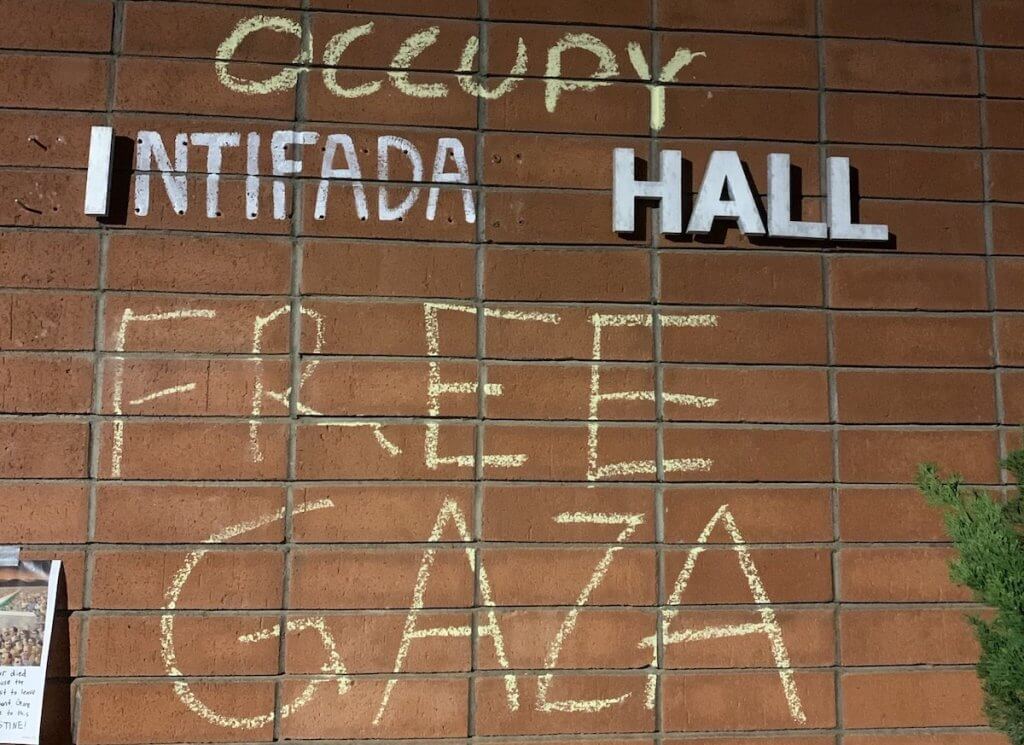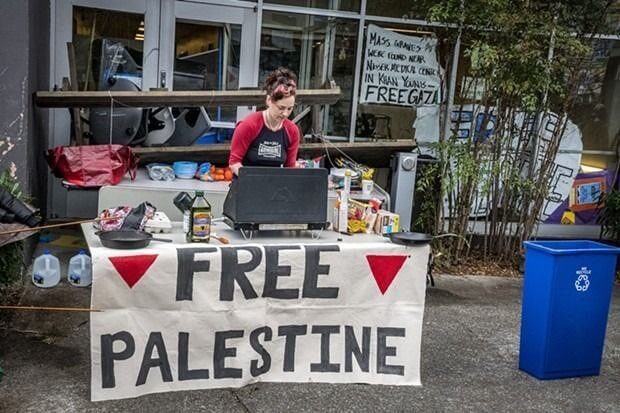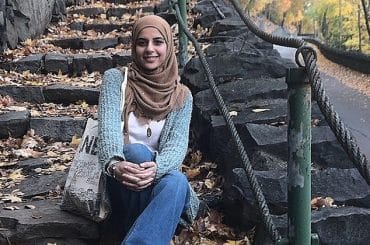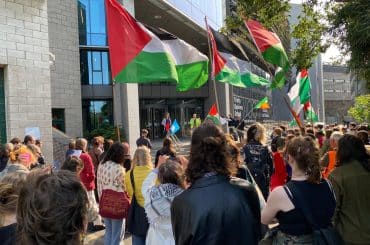On Tuesday police officers converged on California State Polytechnic University, Humboldt and arrested 35 protesters at the campus.
Although it hasn’t received the same kind of mainstream coverage as more well-known schools, Humboldt was the first location where students occupied a building. Taking over the school’s Siemens Hall and renaming it “Intifada Hall.”
The school says the arrested students face a range of charges, including vandalism and conspiracy.
“What was occurring was not free expression or a protest,” said the university in a statement. “It was criminal activity, and there were serious concerns it would spread even further on campus.”
Mondoweiss spoke with Jamilla, a Palestinian-American student at the school and an organizing member of Humboldt for Palestine about Palestine organizing at the school, the police sweep, and what the mainstream media has missed.
Mondoweiss: There hasn’t been a lot of mainstream coverage about what’s happening to Humboldt, compared to some of the bigger, more well-known universities. Can you talk about the school and Palestine activism on campus leading up to this moment?
We’re located in a really rural area of California, so I think that’s kind of partly why there is not as much coverage. The occupation was also started by students and community members who wanted to remain anonymous and they didn’t have any kind of leadership per se, but there was definitely an urgency to do something because nothing else was working and people had already gone through the usual channels. Students wanted to have their voices heard, and they’re calling for a ceasefire, but ultimately it’s also about dismantling the Israeli occupation.
I’m a member of Humboldt for Palestine, and we’ve been a community of organizers that’s been holding regular actions, demonstrations, vigils, and film screenings since October. We weren’t the facilitators of this particular protest [the occupation of a university building]. Like I said, that was a collective of students coming together.
Since we are in such a rural area, prior to the establishment of our organization there wasn’t really much of a presence in terms of Palestine activism. Since the building has been occupied, we’ve been working in a support role for them and it’s been difficult to do this work in such a small community because there’s a certain level of vulnerability that might not exist at schools with larger student bodies.
When was your organization formed?
It was formed in mid-October and it came about very naturally. I’m Palestinian so I’ve been involved in this work for most of my life and doing a lot of this advocacy for most of my life.
After October 7 I was spending was spending some time with one of my Jewish friends. She’s been doing Palestinian advocacy for well over a decade, probably almost twenty years at this point. We got together and felt like we had to do something. We didn’t really know what so we just decided to hold a vigil at one of our local farmers markets. We ended up doing that weekly for about three weeks, and by the third week, it had escalated into this whole protest situation that we weren’t anticipating.
I’m used to people being really hush-hush about Palestine, so I wasn’t expecting that to happen, but ultimately, this whole community showed up, and they’ve been very consistent and dedicated to this liberation movement ever since. So that’s when we started to formalize the organization, create more structure and consistency, and diversify our tactics in terms of the social actions that we’ve been facilitating.

Can you talk about the demands of the students?
First I’d say transparency. Our university’s complicity in this and the wider issue of divestment from Israel are really central to what students are demanding. Upholding BDS demands, we want to be boycotting and divesting from companies that are connected to Israel. We want the university to cut any ties to Israel and for them to be transparent. We also want to ensure that students are not going to be penalized for protesting. We had already seen a lot of students get suspended, so we want the students’ charges dropped, and we want faculty to know they won’t be fired for protesting. I believe students are also calling for the university to make a ceasefire statement, although I personally feel we are beyond those.
You mentioned that students have been suspended. Can you talk about those suspensions, explain the occupation, and talk about the police sweep that just occurred?
The building that was occupied is called Siemens Hall. My understanding is that the administration has suspended students who have been identified as affiliated with the occupation. The administration decided to officially close campus when students started occupying the building rather than keep it open. They basically closed it immediately and called the cops on the students right away, which is what escalated the situation and then we saw the police violence happening. It was a peaceful protest, and there wasn’t violence until the police arrived, as we’re very used to seeing at all of these protests and encampments happening around the country.
So we’ve seen the administration really escalate the situation with how they were responding to it and then we were on standby waiting for an entire convoy of police to show up. We were getting at least three official notices from the school every day letting us know that the campus is closed and that any protester still there is susceptible to being not just arrested, but held liable for their participation.
We received multiple reports for hours on Monday that police were coming to campus to make arrests. Around 9:30 p.m., they started making their orders from various access points on campus, but they didn’t start making arrests until around 3:30 am, I believe. At least 35 people (mostly students and one professor) were arrested but it’s my understanding that as of yesterday afternoon, all have been released. I am unsure of the exact details regarding the charges. Students received a university email the day after arrests were made with quotes from law enforcement and CPH president Tom Jackson commending the actions of law enforcement. Campus is still technically closed and students who live on campus are allowed to walk near their respective areas but are not allowed to walk across campus, and there is a police presence on campus enforcing this
What do you think of this wave of protest that we’re currently seeing across the country?
I never really thought I would see this ever. I’m still amazed at how normalized this issue has become and how activated it is in terms of liberation.
So I’m definitely amazed. The first time I walked around the campus and saw “Free Palestine” graffiti I had conflicting feelings. On one hand, I never thought I’d see this, especially in a small town. I’ve been living here for a long time and it doesn’t really have a Palestinian presence. There are probably less than ten of us.
However, like many Palestinians for the last six months, I’ve also had feelings of dread because we know what the reaction to this kind of activism usually is. I worry about the safety of Palestinians which is vulnerable right now, especially in a small town like this that has a heavy Zionist presence. There isn’t really built-in protection for Palestinians. There’s built-in protection for a lot of other people but not really for Palestinians. We’re kind of always the exception.
So there’s hope, but there’s also dread and fear of repercussions, not just for the students but for anyone fighting for Palestinian liberation. We’re seeing a lot of tactics to silence, control, and punish.
We ran a statement on our site from some Humboldt faculty, condemning police violence against students and expressing support for the BDS demands. How would you assess the support you’ve gotten on campus?
In my personal opinion that doesn’t reflect the overall feeling of people at the school. I think a lot of faculty have felt the pressure from their students to not only provide space to speak about the genocide but also to put their normal instruction to the side to have conversations about all this.
My personal view, based on what I’ve seen within my department, is that some of this is a performative kind of thing for a lot of people to indicate they’re participating. With that being said, there are amazing faculty that have been so steadfast through this and I don’t think students would be as clear and focused without that support. There’s been many faculty that have basically worked around the clock just to ensure that these students are supported.
That’s amazing, but it’s also scary because there’s a real threat of them losing their jobs. They’re putting their jobs on the line and they’re showing up knowing that there’s that risk.
So there’s been great faculty support that needs to be acknowledged and celebrated, but there’s also the performative side of faculty who haven’t really shown their faces on campus since this started.
We started by talking about the lack of reporting on this. What’s been missing from the mainstream coverage that you want people to know about?
I think we’re the first encampment to occupy a building. The irony there is definitely not lost on me or any of us, but I also think it’s been an effective way to speak about what we’re protesting.
There have been tactics that we’ve seen in the process that people do not know about. Two days ago police started showing up with bulldozers, bringing in concrete slabs, and blocking off certain parts of the road. They told students that in order to avoid arrest, they’d have to go through these “checkouts” where you provide your personal information, and then you’re potentially immune from punitive actions.
We thought, “Wow, this looks very familiar. Where else have we seen checkpoints and roads blocked off with cement slabs?” So that stuff has really highlighted the relationship that the U.S. has with Israel in terms of military and policing strategies.
So that’s something that I don’t think has been part of the reporting. I don’t know if people are aware that our school basically tried to create checkpoints. And block off certain roads that are available or not available to certain people.
I will also say I am very proud of the students who have been showing up and have been involved from the beginning. They’re putting their bodies and their academic standing on the line. I hope that with all these encampments that are happening all throughout the country people recognize what the longevity of this work really entails. Whether these universities are meeting the demands of the students, this work continues and I hope that people can remain committed to the longevity of this work and are not just involved in this particular facet of it. It’s currently the active and accessible way of being involved but I hope that it continues on until we see a free Palestine.


